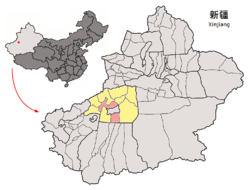Latest News for: aksu, xinjiang
Edit
No casualties reported after 5.0-magnitude quake jolts Xinjiang
Xinhua 05 Feb 2025
The earthquake hit Kuqa City in Aksu Prefecture of Xinjiang at 7.42 a.m ... No casualties reported after 5.0-magnitude quake jolts Xinjiang.
Edit
5.0-magnitude quake hits China's Xinjiang: CENC
Xinhua 05 Feb 2025
... City in Aksu Prefecture of northwest China's Xinjiang Uygur Autonomous Region at 7.42 a.m.
Edit
1st Ld-5.0-magnitude quake hits China's Xinjiang: CENC
China.dot.org 05 Feb 2025
... Aksu Prefecture of northwest China's Xinjiang Uygur Autonomous Region at 7.42 a.m.
Edit
5.0-magnitude quake hits China's Xinjiang
China.dot.org 05 Feb 2025
A 5.0-magnitude earthquake jolted Kuqa City in Aksu Prefecture of northwest ...
Edit
United in service: Young soldiers guarding border in Xinjiang
China Daily 29 Jan 2025
In Wushi county in Aksu in northwest China's Xinjiang Uygur autonomous region, near the border with Kyrgyzstan, the No 3 border marker is located at a mountain peak at an altitude of over 4,200 meters.
Edit
A life-saving 4,000 km journey! 7 yr-old girl returns to Xinjiang after record-breaking heart transplant in Hangzhou
People Daily 22 Jan 2025
Mayire Ailiximu (Yiyi), the lucky little girl from Baicheng county, Aksu prefecture, northwest China's Xinjiang Uygur Autonomous Region, has recovered well from a successful heart transplant operation performed on Dec.
Edit
In pics: ethnic Tajik train conductor's journey amid China's Spring Festival travel season
Xinhua 21 Jan 2025
Train conductor Airkir Duliki (R) comforts a child who has lost contact with his parents at the stand of Aksu Railway Station, northwest China's Xinjiang Uygur Autonomous Region, Jan.
Edit
Across China: Green-painted trains provide cost-effective rides for rural vendors
China.dot.org 16 Jan 2025
Edit
From cotton to data, tech-driven industrial renewal spins new economic threads
Beijing News 26 Dec 2024
© Provided by Xinhua A drone photo shows a self-driving seeder working in the farmland in Awat County of Aksu, northwest China's Xinjiang Uygur Autonomous Region, March 27, 2024 ... From Xinjiang's ...
Edit
Guest Opinion: The truth about Xinjiang and its Uygur population
Independent online (SA) 24 Dec 2024
Edit
China Focus: Xinjiang firms fight back US sanctions to protect local jobs
China Daily 18 Dec 2024
URUMQI -- Gulnur Akhniyaz, a mother of two from Aksu prefecture in Northwest China's Xinjiang, joined Aksu Huafu Textiles Company in 2021 as a knitter to support her family, only to have her dream of a better life disrupted by an unexpected layoff.
- 1
- 2
- Next page »




